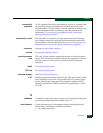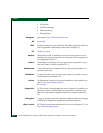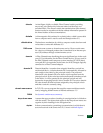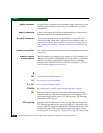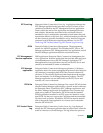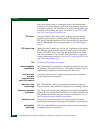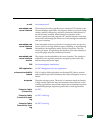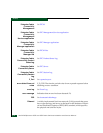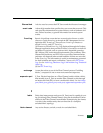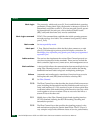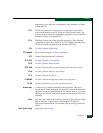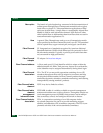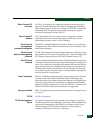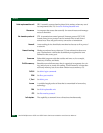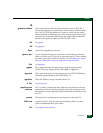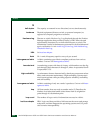
Glossary
g-19
Glossary
Ethernet hub A device used to connect the EFC Server and the directors it manages.
event code A three-digit number that specifies the exact event that occurred. This
code provides information on system failures, such as hardware fail-
ures, failure locations, or general information on normal system
events.
Event Log
Record of significant events that have occurred on the director or switch
(director or switch Event Log) or through the EFC Management Services
application (EFC Event Log).
There are two Event Logs: director or
switch Event Log, and EFC Event Log.
(1) Director or switch Event Log. Log displayed through the Product
Manager application that provides a history of events for an individ-
ual director or switch, such as system events, degraded operation,
FRU failures, FRU removals and replacements, port problems, Fibre
Channel link incidents, and EFC Server-to-product communication
problems. All detected software and hardware failures are recorded
in the Event Log. The information is useful to maintenance personnel
for fault isolation and repair verification. Contrast with EFC Event
Log. See also Audit Log; Hardware Log; Link Incident Log; Threshold
Alert Log.
(2) See EFC Event Log.
exchange A term that refers to one of the Fibre Channel protocol “building
blocks,” composed of one or more nonconcurrent sequences.
expansion port E_Port. Physical interface on a Fibre Channel switch within a fabric,
that attaches to an E_Port on another Fibre Channel switch through
an interswitch link (ISL) to form a multiswitch fabric. See also bridge
port; fabric port; generic port; node port; segmented expansion port.
F
fabric Entity that interconnects node ports (N_Ports) and is capable of rout-
ing (switching) Fibre Channel frames, using the destination ID infor-
mation in the Fibre Channel frame header accompanying the frames.
A switch is the smallest entity that can function as a complete
switched fabric topology.
fabric element Any active director, switch, or node in a switched fabric.



